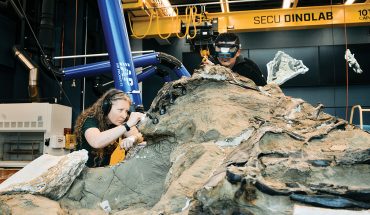
Tony Avent and his wife Anita share a love of their business and their lush surroundings, which comprise a botanic garden and a mail-order nursery on 28 acres in Garner. The spot is home to several dozen of the world’s biggest perennial collections.
by Liza Roberts
photographs by Justin Cooke
On a hot, cicada-loud summer day at Tony Avent’s place, a black cat slips through the canes of a massive muscadine vine, one of 23,000 plant varieties that fill these 28 Raleigh acres.
Home to Avent’s Juniper Level Botanic Garden and his Plant Delights Nursery, it’s a lush horticultural wonderland, a grand experiment, and a monument to one man’s consuming passion.
“People are drawn here,” Avent says casually as he walks the property, as he does every day, thousands of steps from nursery to botanical garden and back again, stopping among acres of beds, 30 greenhouses, expansive research gardens, and several dozen of the world’s largest collections of perennials, to admire a plant or yank a weed. “They don’t know why they come, but they come.”

A Lufkin White Hibiscus

When they do, visitors are often overwhelmed with what they find – by the garden’s beauty, vastness, and abundance. This pleases Avent, who is also an award-winning author, columnist, and lecturer, and is about to turn 60. He hopes visitors will find their “neural pathways rewired” by immersion in nature. “For most people, plants are just wallpaper. Furniture. I don’t think most people realize they’re living, breathing, communicating beings.”
Avent is not most people. As a child growing up in Raleigh, he says he knew from an early age that plants were more than decorative. They spoke to him. He had his own greenhouse at 8, propagated his own plants, lingered at garden centers, and pored over the gorgeous catalogs of Wayside Gardens, a renowned South Carolina mail-order nursery. His parents eventually granted his wish to visit Wayside. But when he got there, Avent was “devastated.” The Eden he’d imagined was nowhere to be found. A young teenager at the time, Avent made a decision then that has informed his life ever since: “When I grow up, I’m going to start a mail-order nursery, and we’ll actually have a garden, and nobody will ever be disappointed when they come to visit.”

Tony Avent oversees 30 greenhouses on his property. Plants are propagated and cultivated in them, and orders are processed.
He put that plan in action in 1988 with the purchase of 2.2 acres in Garner. He turned the property into an oasis of exotic plants that could be visited as well as bought. The idea was that he would fund his botanical passions by selling what he grew, “sort of like a gambler opening a casino.” A few years later, Plant Delights was profitable enough that his plan worked: He was able to leave his day job as landscape director of the N.C. State Fairgrounds to work as a nurseryman full time, and also add another 5.5 acres. He’s been adding parcels ever since. “We’ve never gone out looking for land,” he says, “it comes to us.” He knows why: “This land was intended to be preserved.” Thanks to the success of Plant Delights (ranked among the top 7 online plant nurseries in the U.S. by Garden Design Magazine) and to a reorganization that is making his Juniper Level Botanic Garden a nonprofit, the land should get its wish.
Nothing could make him more satisfied. “I’m a kind of horticultural savant,” he says. “I’m not a normal person. I have this need to work with plants. I couldn’t have done anything else.”
The garden speaks
As he makes his way around the grounds, which hold the world’s largest collections of ferns and a dozen other kinds of plants, he points out a pond with its own floating, water-filtering island. Thanks to an intricate system of storm drains, ponds, and an aerating waterfall, Avent captures and reuses all rainwater that hits the property. “You learn so many lessons from nature if you only look,” Avent says, stooping to lift a daylily bloom. “I walk around, and the garden speaks.” It tells him where plants should go, he says; how to break the rules, when to learn new ones.

A Sarracenia Daina’s Delight Pitcher Plant

A Panache Canna Lily
Around him, a small army of garden workers go about their business: A man in a pith helmet drives a golf cart filled with root-wrapped perennials, women in gardening gloves tend to canopied hosta beds, plant propagators and mail-order fulfillers go in and out of greenhouses. “We are all the garden,” he says. “The garden is us. There is one energy.”
Avent’s wife and business partner, Anita, walks with him. She shares his mindset, his passion, and his iconoclasm. A student of Eastern religions and a teacher of mindfulness and non-duality, she and Tony knew each other in the fourth grade at Lacy Elementary School in Raleigh and re-met online a few years ago. Tony’s first wife Michelle had died a year-and-a-half earlier, and Anita was divorced. They had an immediate connection. “This was supposed to happen,” Tony says now. “I think if you’re tuned into that, you just naturally pick up on it when it happens.” When Anita began teaching him about “the one-ness of the universe,” he says, “it made me understand a lot of things I felt, but didn’t have words for.” Anita smiles. “He gets me and I get him,” she says. “And we’re not easy to understand.”
Their mutual appreciation of nature isn’t hard to grasp. “The garden is a teacher for us,” Anita says. “The perfect example of equanimity. A sermon, a metaphor, and a love letter all in one.” Her appreciation for Tony and his work is more than poetic – she has helped him reorganize his business; separate the botanic garden from the nursery; set up a foundation for the botanic garden; and get his massive catalogs written and edited. She’s also working with him on a book about the garden that will be published in 2018. “We’re like Felix and Oscar,” she says. “I’m Felix, he’s Oscar.” The Frank Harmon-designed house they are building on the edge of the property is one of the famed, recently-retired architect’s last residential projects. The Avents plan to move in at the end of this month.
With Anita’s help, Tony says he is also able to look beyond their own tenure on this land. “We want to leave something behind here.” Ultimately, he says, they hope Juniper Level Botanic Garden will become a sister institution to N.C. State’s JC Raulston Arboretum, an organization with which Tony has long had close ties. Avent was Raulston’s student at N.C. State and still considers the deceased elder plant statesman a mentor, informing many of his gardening philosophies, including a zeal for sharing plants and experimenting with them. “If you’re not killing plants,” Raulston told Avent, “you’re not growing as a gardener.” Avent has nothing to worry about on that score: He boasts to have killed over 30,000 kinds of plants over the years. “There’s almost nothing we won’t do here,” he says.

Gardens like this one devoted to research and breeding trials cover several acres of the property.
He points out a bed of thriving, unlikely bedfellows: A golden barrel cactus standing squatly beside a feathery crystal lady fern; a smattering of pitcher plants happy with a mangave (a cross between an agave and a manfreda) as a neighbor. “We’re trying to show people: Look at what you can grow! There’s all of this exciting stuff, and we just want to share it with more people.”
One of the two phones holstered to Avent’s belt rings; he takes the call and dispenses with a bit of managerial business, then picks up his train of thought: “All of the books say it won’t work,” he says, to grow such unlikely flora together, “but our whole garden is about change. We have a very different philosophy. The whole idea is that there’s always something to see.”
Free thinker
In one of the punny T-shirts he favors, khaki shorts, and a leather-clad Swiss Army pocket watch that hangs with his phones from his belt, Avent is as suited up as he gets. No hat, wristwatch, sunglasses, or gloves – ever. They get in the way. “I like to feel the earth,” he says, “the electricity in the ground, the pulse of the earth.” In winter, his hands get so cold from digging they go numb, and his skin is perpetually tan from hatless days. (He also eschews sunblock. “Would you put sunscreen on your other organs?” he asks.)
Conventional wisdom is not high on Avent’s list. Take climate change: Get over it, he says. “The climate has been changing from the beginning of time.” Pruning shrubs and trees? “If they’re too big for your space, don’t prune them, move them.” Preserving indigenous species? “There is no such thing as native plants. There is only time.” Humans, he says, “like to draw lines.” He stops for a moment, smiling. “Bring back Pangea!” He laughs out loud. “Then everything would be indigenous.”
He’s funny about it, but he’s serious. When an arboretum in Spartanburg invited Avent to plant a tree for Arbor Day, the organization refused his offer of a redwood, because it wasn’t native to the region. The arboretum asked him to bring and plant a native tree instead. “O.K.” he told the arboretum, “if you invite only native people” to the ceremony.

Work is almost complete on the Frank Harmon-designed house the Avents are building on the edge of their property. It is one of the final residential projects for the acclaimed, recently retired architect.
His feelings on the subject go deep. A hidebound commitment to indigenous plants, he argues, is wrongheaded horticulturally and, he hints, possibly immoral. “It’s interesting how we promote biodiversity in people, but not in plants. It’s very paradoxical.” A thriving ecosystem counts on a mixed bag of living things, he says, which encourages the same in other species, like animals and insects, which in turn again help plants and people thrive. “Biodiversity begets biodiversity.” That’s why he has so many birds, bees, butterflies, snakes, and other critters (including thousands of human visitors every year) on his land, he says.
For a man of strong opinions and moral bearings, Avent’s sense of humor – and wonder – is ever-present. Discovering one recent evening that yellow swallowtail butterflies had covered his Surprise Lilies had him laughing with glee – who knew those butterflies liked Surprise Lilies? As holder of the world’s largest collection of Surprise Lilies, probably nobody.
Avent’s nonstop enthusiasm is evident in a storytelling instinct triggered by everything he sees. He can tell you a tale about just about every plant in the place – where he first saw it, where he got it, what people generally misunderstand about it, what it likes best. A clump of daylilies nodding over an elephant ear plant has him recalling the journey he took to Turkey where he picked up the elephant ear. It’s one of the 70-odd international plant expeditions he has taken, trips that have broadened his collection innumerably, and his frame of reference.
He’ll be drawing on all of that in October, “an intense month” when he gets his brick-like catalog ready for December. To do that, Avent will spend countless hours in the garden, observing his plants and taking notes on their size and appearance so he can accurately describe them in his catalog. “The plants tell me what to write,” he says, “it just pours out.” He takes the responsibility seriously, but laces his horticulturally precise descriptions with humor and double-entendres. It’s an unlikely combination, one that has won him many thousands of followers.
“I’m like a crazy preacher. But I think we have a really good message.”


